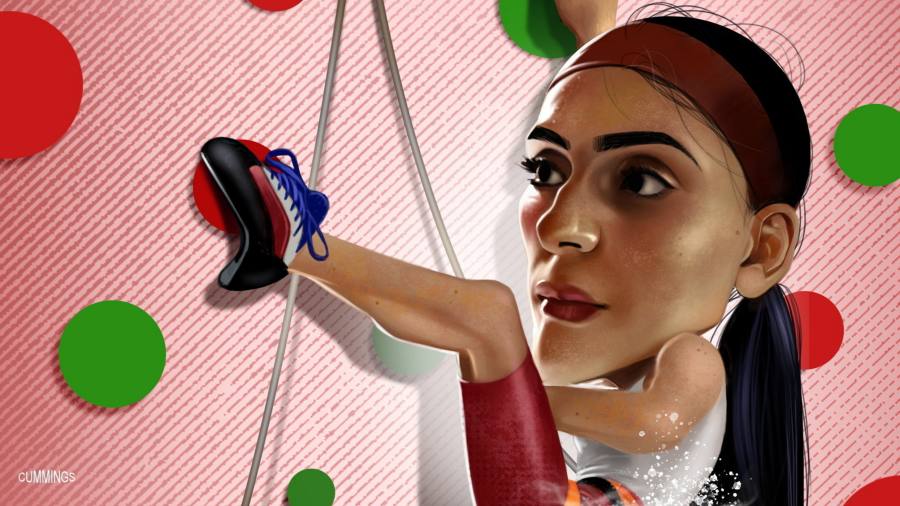
With a ponytail and a headband to tame her black hair, Elnaz Rekabi marched poker-faced towards the wall at the Asian climbing championships in Seoul.
The 33-year-old could have been a competitor from any country. But in more than four decades under the Islamic republic, no Iranian female athlete is known to have attended an international sporting contest without the hijab and returned to tell the tale. Rekabi has become the figurehead for defiant Iranian women whose recent wave of demonstrations against the hijab have evolved into a threat to the ruling theocracy. Their protests — first sparked by the death of 22-year-old Mahsa Amini who had been arrested by morality police for wearing un-Islamic attire — are now entering their fifth week. The resulting crackdown by security forces has claimed the lives of 144 Iranians, according to Amnesty International.
As a result, the reputation of Iran’s top female climber, known by the nickname “spider woman”, is no longer limited to the small community of sport climbers and their fans. Rekabi has made history, although in doing so has risked the regime’s wrath and thrown her ambitions to compete in the 2024 Olympics in France into uncertainty.
“The hijab is more a security issue than a religious concern for the Islamic republic,” says one political analyst. A reform-minded cleric agrees that the head-covering has become highly politicised. “Islam is not as tough on the hijab as it is on issues like charging interests on banking deposits, which is equated to fighting with God,” he says. “But the system’s sensitivities toward the hijab is far bigger than it is for usury.”
After Rekabi’s appearance at the International Federation of Sport Climbing (IFSC) Asian championships last Sunday, she appeared to go missing for about 48 hours in Seoul. She then announced on Instagram that she was safe and heading back home. She returned to a hero’s welcome at the airport, but claimed she had merely been in so much of a rush to get to the climbing wall that she had inadvertently forgotten to wear her scarf.
Many Iranians find this hard to believe. What happened after the event is not clear. Had she not expressed remorse, some athletes say, she could have been transferred straight from the airport to the notorious Evin prison. There is now anxious speculation about the consequences of her daring gesture for other female athletes attending overseas events.
“With the slightest negligence, athletes could be deprived of competitions for at least two years,” says Ali Baratzadeh, an Iranian climbing champion and training partner previously described by Rekabi as “technically the best”. “If the government restricts her, then her path to her [Olympics] goal will become very difficult or impossible,” he says. Only last month, Iran’s supreme leader, Ayatollah Ali Khamenei, praised “those brave and pious women who stand on championship platforms and refuse to shake hands with men . . . and stand up with the Islamic hijab” for having turned their “technical victories into ethical victories”.
While the wearing of the hijab has enormous symbolic significance, it is not the biggest problem facing Iranian women. Far more problematic are women being denied senior jobs in the government and suffering discrimination over divorce and custody of children. Unofficially, women working in private companies, restaurants, art galleries and outdoor sports have for years been able to avoid wearing the hijab if they wish to. This growing gulf between a quietly modernising secular society and the ruling state which resists reform has exploded into national turbulence.
For Rekabi, who was born into a traditional religious family in the city of Zanjan, the professional road has been a lonely one. She was first inspired to start climbing at the age of 12, when she went to see her brother, who is also a famous climber, compete in an international tournament held in Iran. “There, I was surprised to realise women could also be sport climbers with the hijab,” she said, after watching overseas competitors who had been forced to observe Iran’s dress code. She wasted no time and only a year later was ranked second in the country. Since then, she has won more than 80 medals at home and abroad, including a gold medal at Asia Cup in China in 2017 and a bronze at the 2021 IFSC Climbing World Championships in Russia. In Seoul last week, she ranked fourth.
Zeinab Tarasi who runs the Chakavak climbing club in Zanjan says “a woman climber is indeed fighting with traditions”. Rekabi had to be coached by her brother after the authorities said she could not exercise in the same gym as men. She now trains herself. “I learnt mostly from the videos I watched,” she said in a live Instagram interview. “When I go to matches overseas all alone, I compete with those who not only have coaches, but masseurs and perhaps even therapists.” Even though she is known as the spider woman, she once said she would prefer to be called “Mustang” because a free-roaming horse better suited her character. Her battle is not merely with authorities at home: she is sometimes prevented from attending competitions when European nations deny her a visa.
After her interview with the state media at the airport, Rekabi posed for a photo clad in her black Nike cap, black hoodie and blue jeans, a clear breach of the Islamic dress code which dictates a scarf and a long shirt. This time she looked angry. We do not know what fate awaits her — and even as she is celebrated, she has kept silent.